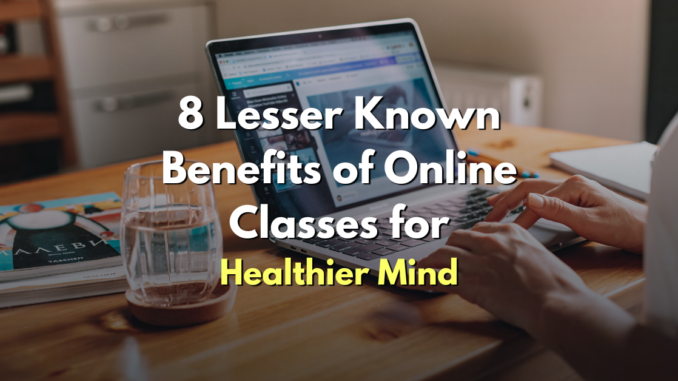
In recent years, the popularity of online classes has surged among students, providing them with flexible and accessible learning opportunities. Beyond the convenience, online education offers significant mental health benefits by reducing stress and anxiety. In this article, we’ll explore how online classes can positively impact mental health and contribute to a healthier, more balanced lifestyle for students.
- Flexibility and Control Over Your Schedule
- Lowering Your Anxiety Through Self Paced Learning
- Access to a Wider Range of Resources
- Promoting a Better Work-Life Balance
- Encouraging Self-Discipline and Responsibility
- Reducing Environmental Stressors with Online Classes
- Social Interaction on Your Terms
- Case Studies and Real-Life Experiences
- FAQ: 8 Benefits of Online Classes for Mental Health
Flexibility and Control Over Your Schedule
One of the most significant benefits of online classes is the flexibility that they offer. Traditional in-person classes often come with rigid schedules that can be challenging to manage alongside other responsibilities. Online classes, on the other hand, allow students to learn at their own pace and on their own time.
Reduced Scheduling Stress: Without the need to commute to campus or adhere to strict class times, students can plan their study sessions around their personal and professional lives. This flexibility can significantly reduce the stress associated with balancing multiple commitments.
Personalized Learning Environment: Students can create a learning environment that suits perfectly to their individual needs, whether it’s a quiet home office, a local coffee shop, or even outdoors. A comfortable and familiar setting can enhance focus and reduce anxiety.
Lowering Your Anxiety Through Self Paced Learning
Online classes often provide materials and assignments that can be completed at a student’s own pace. This self-paced learning model is particularly beneficial for reducing anxiety of meeting deadlines of certain assignments.
Avoiding Classroom Pressure: In traditional classrooms, the pressure to keep up with peers can be overwhelming. Online learning allows students to revisit lectures and materials as needed without feeling rushed, fostering a more relaxed and confident approach to education.
Dealing with Social Anxiety: For students who experience social anxiety, the online format can be a game changer. Interacting through forums and emails, rather than face-to-face, can make participation less intimidating and more manageable.
Access to a Wider Range of Resources
Online classes often come with a plethora of resources, including recorded lectures, interactive modules, and digital libraries. Having easy access to these resources can support mental health in various ways.
Consistent Access to Information: The ability to access course materials anytime can reduce the stress of missed classes or incomplete notes. Students can review content at their own pace, which ensures a better understanding of the subject matter.
Enhanced Support Systems: Many online programs offer robust support services, including virtual office hours, tutoring, and counseling. These resources can provide additional help and reassurance, further reducing anxiety.
Promoting a Better Work-Life Balance
Balancing school with other responsibilities is a common source of stress for students. Online classes offer a way to achieve a healthier work-life balance.
Integration with Daily Life: Students can integrate their studies with their daily routines, making it easier to manage family, work, and personal time. This integration can lead to a more balanced and less stressful lifestyle.
Flexible Deadlines: Many online courses offer flexible deadlines, allowing students to complete assignments at their convenience. This flexibility can reduce the pressure of meeting tight deadlines and improve overall mental well-being.
Also Read: 444+ Helpful Affirmations for Everyday
Encouraging Self-Discipline and Responsibility
While the flexibility of online classes is a significant advantage, it also requires a certain level of self-discipline and responsibility. These skills are crucial for both academic success and mental health.
Building Time Management Skills: Successfully navigating an online course requires effective time management. Developing this skill can reduce procrastination and the anxiety that often accompanies last-minute cramming.
Fostering Independence: Online learning encourages students to take ownership of their education. This sense of independence can boost confidence and self-esteem, contributing to better mental health.
Reducing Environmental Stressors with Online Classes
The physical environment of traditional classrooms can sometimes contribute to stress and anxiety. Online classes eliminate many of these stressors.
Eliminating Commute Stress: The daily commute to and from campus can be a significant source of stress. Online classes remove this burden, saving time and reducing the stress associated with traffic, public transportation, and parking.
Comfortable Learning Spaces: Studying from a comfortable and familiar environment can reduce distractions and create a more positive and focused learning experience.
Social Interaction on Your Terms
While some might worry that online classes lack social interaction, many programs incorporate various ways to connect with peers and instructors.
Virtual Communities: Online forums, group projects, and video calls provide opportunities for meaningful interaction without the pressure of in-person encounters. These virtual communities can offer support and camaraderie, helping to alleviate feelings of isolation.
Tailored Social Engagement: Students can choose how and when to engage with peers and instructors, allowing for more comfortable and less stressful interactions.

Case Studies and Real-Life Experiences
To understand the real impact of online classes on mental health, let’s look at some real-life examples:
Case Study 1: “Sunita” A Working mom
Sunita, a working mom, enrolled in an online degree program. She reported significant reductions in stress over the course period. The flexibility allowed her to study after her children went to bed. It became easy for her balancing work, family, and education without feeling overwhelmed.
Case Study 2: “Manish” a Student with Social Anxiety
Manish, a student with severe social anxiety, found that online classes provided a safe and comfortable way to pursue his education. The ability to participate in discussions through written forums rather than speaking in front of a class helped him engage more fully with the material and excel in the finals.
Conclusion
Online classes offer numerous mental health benefits by providing flexibility, reducing stress and anxiety, and promoting a better work-life balance. The ability to learn at one’s own pace, access a wealth of resources, and study in a comfortable environment can significantly enhance the educational experience. As more students and institutions embrace online education, the positive impact on mental health will become increasingly evident. By choosing online classes, students can achieve academic success while maintaining their mental well-being, leading to a more fulfilling and balanced life.
FAQ: 8 Benefits of Online Classes for Mental Health
Q: How do online classes offer flexibility?
A: They offer significant flexibility by allowing students to learn at their own pace and on their own time. This eliminates the need for commuting and adhering to rigid class schedules, reducing the stress associated with balancing multiple commitments.
Q: What resources do online classes provide?
A: Online classes provide extensive resources, such as recorded lectures, interactive modules, and digital libraries. These resources ensure consistent access to information, which can reduce the stress of missed classes and incomplete notes.
Q: Can online classes reduce anxiety?
A: The self-paced learning model of online classes allows students to complete materials and assignments at their own speed. This approach reduces the pressure to keep up with peers and helps students manage their anxiety by allowing them to revisit lectures and materials as needed.
Q: How do online classes encourage self-discipline?
A: The flexibility of online learning requires students to develop self-discipline and effective time management skills. These skills reduce procrastination and the anxiety of last-minute cramming. Additionally, the independence fostered by online learning boosts confidence and self-esteem.
Q: How do online classes facilitate social interaction?
A: Through forums, group projects, and video calls, allowing for flexible and comfortable interactions.

Leave a Reply